In my last couple of posts, I have used an example from Captain Francis Grose’s Dictionary of the Vulgar Tongue. This is a book I have had for a while, but only just looked through it again in the last month to find some quotes relevant to the subjects of the last couple of weeks.
The book is a fascinating record of street language of the 18th and early 19th centuries, and was collected by Grose during night walks across London, to drinking dens, along the docks, meeting with the crews of ships arriving in the Thames, from criminals and by listening to the conversations he heard across the London streets.
His book was published in 1785, and it was later republished in an expanded form in 1811 as a Dictionary of Buckish Slang, University Witt and Pickpocket Eloquence.
Captain Francis Grose was born in 1731 to a father who had arrived from Switzerland and had set up a jewelry business in London. His mother was from London. He served in the army, from where the title Captain came, and also studied art, however his real interest seems to have been the history of the country in its many forms.
In retirement from the Army, he became a serious antiquarian, and published a six volume set of Antiquities of England and Wales between 1773 and 1787. Two years later he followed up with a two volume set of the Antiquities of Scotland.
Captain Francis Grose ( © The Trustees of the British Museum):
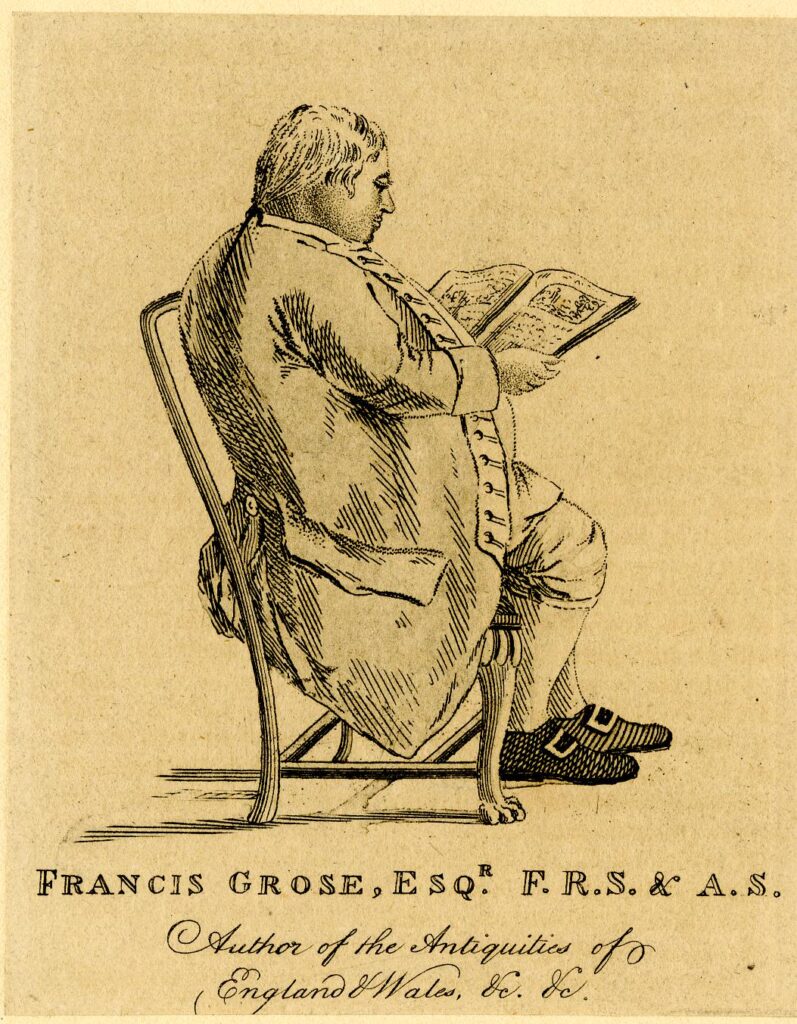
His Dictionary of the Vulgar Tongue was put together based on the phrases he heard on the streets, in pubs, the docks, on ships, and from anywhere where those who were not members of so called “polite society” would congregate.
In 1755, a few decades before the Dictionary of the Vulgar Tongue was published, Samuel Johnson had published his Dictionary of the English Language. This was an important and groundbreaking work, and Captain Grose’s dictionary is in many ways equally important, capturing the “vulgar” language and phrases that would not appear in Johnson’s dictionary.
The phrases in the Dictionary of the Vulgar Tongue tell us of the life of those who were poor, who practiced criminality, in tough professions such as the naval and on crews on merchant ships.
Certain themes run through the phrases in the dictionary. Crime and execution being one, prostitution and sexual relations between men and women being another main theme.
Grose, the Antiquarian ( © The Trustees of the British Museum):
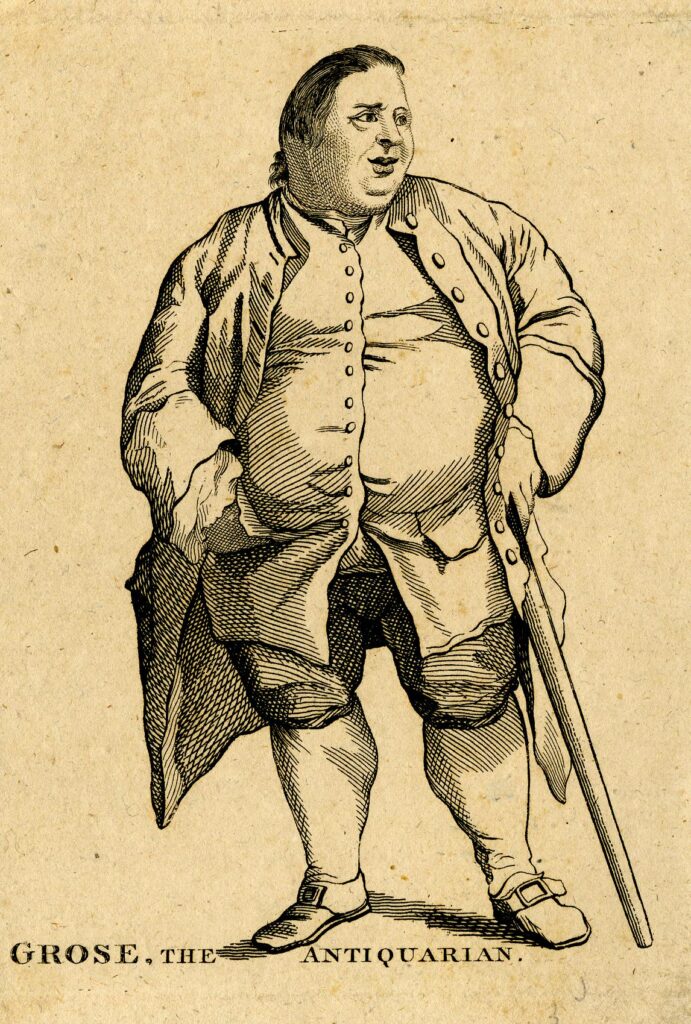
Many of the phrases recorded in the dictionary are incredibly crude, and it would be interesting to know if all the phrases are genuine, or whether some of those who provided phrases for Grose, made some up to see what they could get away with, and whether they could fool the antiquarian who had come looking for the vulgar language of the working and criminal classes.
There is a wonderful scene in the TV series Blackadder, the episode featuring Samuel Johnson’s Dictionary, when Johnson claims his dictionary is a complete record of the English language, Blackadder starts making up random, meaningless words. You can watch the extract from the programme by clicking here. I can imagine the same scene when Grose was recording entries for his dictionary.
Whilst the majority of the phrases in the dictionary are no longer heard, many still are, for example HUSH MONEY and MUD LARK, although Mud Lark now applies to those who search the foreshore for interest rather than necessity, to try and make some money, as was the case in the 18th century.
Some words described in the dictionary are still in use today, but with a wider meaning. The word HEDGE was in the dictionary, and today is still in use mainly in the financial markets as a risk management approach to avoid losses. The 18th century description by Grose explains in a couple of sentences how this complex financial method works.
Some phrases in Grose’s dictionary come up in surprising places today. The Bruce Willis film Die Hard seems now to be a Christmas film (and yes, it is on Channel 4 on Saturday 23rd December at 9pm). DIE HARD was not a term made up for the name of the film, it was in use in the 18th century, and although slightly different, you can see why the term was chosen for the name of the film.
You had to be careful how you used some phrases as those such as GOOD MAN had a very different meaning depending on where you were in London when you used it. Descriptions such as BUG-HUNTER and MITE provide an idea of living conditions in 18th century London.
So thanks to Captain Grose, here are a selection of the words and phrases from his dictionary, between the letters A to M.
They tell of life on the London streets, who you might meet, the tricks used by the criminal classes, punishments, places across the city, societies, and general day to day life.
I have left out the most vulgar, but you should get an idea from the following, starting with:
AFFIDAVIT MEN – Knights of the post, or false witnesses, said to attend Westminster Hall, and other courts of justice, ready to swear any thing for hire.
ANGLERS FOR FARTHINGS – Begging out of a prison window with a cap, or box, let down at the end of a long string.
ARK RUFFIANS – Rogues who, in conjunction with watermen, robbed, and sometimes murdered, on the water, by picking a quarrel with the passengers in a boat, boarding it, plundering, stripping, and throwing them overboard.
BARBER’S CHAIR – She is as common as a barber’s chair, in which a whole parish sit to be trimmed; said of a prostitute.
BARREL FEVER – He died of the barrel fever; he killed himself by drinking.
BEARD SPLITTER – A man much given to wenching.
BEGGAR MAKER – A publican, or ale-house keeper.
BERMUDAS – A cant name for certain places in London, privileged against arrest, like the Mint in Southwark.
BETWATTLED – Surprised, confounded, out of one’s senses.
BILLINGSGATE LANQUAGE – Foul language, or abuse. Billingsgate is the market where the fish women assemble to purchase fish; and where, in the dealings and disputes, they are somewhat apt to leave decency and good manners a little on the left hand.
BOARDING SCHOOL – Bridewell, Newgate, or any other prison, or house of correction
BOW-WOW SHOP – A salesman’s shop in Monmouth Street; so called because the servant barks. and the master bites.
BUG-HUNTER – An upholsterer.
BULK AND FILE – Two pickpockets; the bulk jostles the party to be robbed, and the file does the business.
BUM BOAT – A boat attending ships to retail greens, drams, &c. commonly rowed by a woman; a kind of floating chandler’s shop.
BURN CRUST – A jocular name for a baker.
CATERWAULING – Going out in the night in search of intrigues, like a cat in the gutters.
CHEAPSIDE – He came at it by way of Cheapside; he gave little or nothing for it, he bought it cheap.
CHELSEA – A village near London, famous for the military hospital. To get Chelsea; to obtain the benefit of that hospital. Dear Chelsea, by God! an exclamation uttered by a grenadier at Fontenoy, on having his leg carried away by a cannon-ball.
CHURCHYARD COUGH – A cough that is likely to terminate in death.
CIT – A citizen of London
CITY COLLEGE – Newgate.
CLINK – A place in the Borough of Southwark, formerly privileged from arrests; and inhabited by lawless vagabonds of every denomination, called, from the place of their residence, clinkers. Also a gaol, from the clinking of the prisoners’ chains or fetters; he is gone to clink.
COLLEGE – Newgate, or any other prison. New College; the Royal Exchange. King’s College; the King’s Bench prison. He has been educated at the steel and took his last degree at college; he has received his education at the house of correction, and was hanged at Newgate.
CONTRA DANCE – A dance where the dancers of the different sexes stand opposite each other, instead of side by side, as in the minuet, rigadoon, lourve, &c. and now corruptly called a country dance.
COVENIENT – A mistress.
COVENT, or CONVENT GARDEN, vulgarly called COMMON GARDEN. Anciently, the garden belonging to a dissolved monastery; now famous for being the chief market in London for fruit, flowers, and herbs. The theatres are situated near it. In its environs are many brothels, and not long ago, the lodgings of the second order of ladies of easy virtue were either there, or in the purlieus of Drury Lane.
COVENT GARDEN ABESS – A bawd.
COVENT GARDEN AGUE – The venereal disease. He broke his shins against Covent Garden rails; he caught the venereal disorder.
COVENT GARDEN NUN – A prostitute.
DINING ROOM POST – A mode of stealing in houses that let lodgings, by rogues pretending to be postmen, who send up sham letters to the lodgers, and whilst waiting in the entry for the postage, go into the first room they see open, and rob it.
DIP – to dip for a wig. Formerly in Middle Row, Holborn, wigs of different sorts were, it is said, put into a close-stool box, into which, for three-pence, any one might dip, or thrust in his hand, and take out the first wig he laid hold of; if he was dissatisfied with his prize, he might, on paying threepence, return it and dip again.
DONE UP – Ruined by gaming and extravagence.
DUCK – A lame duck; an Exchange Alley phrase for a stock-jobber, who either cannot or will not pay his losses, or differences, in which case he is said to ‘waddle out of the alley’, as he cannot appear there again till his debts are settled and paid; should he attempt it, he would be hustled out by the fraternity.
DUFFERS – Cheats who ply in different parts of the town, particularly about Water Lane, opposite St. Clement’s church in the Strand, and pretend to deal in smuggled goods, stopping all country people, or such as they think they can impose on, which they frequently do, by selling them Spitalfields goods at double their current price.
DUTCH FEAST – Where the entertainer gets drunk before his guest.
DIE HARD – To die hard, is to show no signs of fear or contrition at the gallows; not to whiddle or squeak. This advice is frequently given to felons going to suffer the law, by their old comrades, anxious for the honour of the gang.
ESSEX LION – A calf; Essex being famous for calves, and chiefly supplying the London markets.
ESSEX STILE – A ditch; a great part of Essex is low marshy ground, in which there are more ditches than stiles.
FAGGER – A little boy put in at a window to rob the house.
FANCY MAN – A man kept by a lady for secret services.
FINISH – The finish; a small coffee-house in Covent Garden market, opposite Russell Street, open very early in the morning, and therefore resorted to by debauchees shut out of every other house. It is also called Carpenter’s coffee house.
FLY-BY-NIGHT – You old fly-by-night; an ancient term of reproach to an old woman, signifying that she was a witch and alluding to the nocturnal excursion, who were supposed to fly abroad to meetings, mounted on brooms.
FOUNDLING – A child dropped in the streets, and found, and educated at the parish expense.
Image of the Foundling Hospital established in 1739 by Thomas Coram to provide a home for foundlings ( © The Trustees of the British Museum):
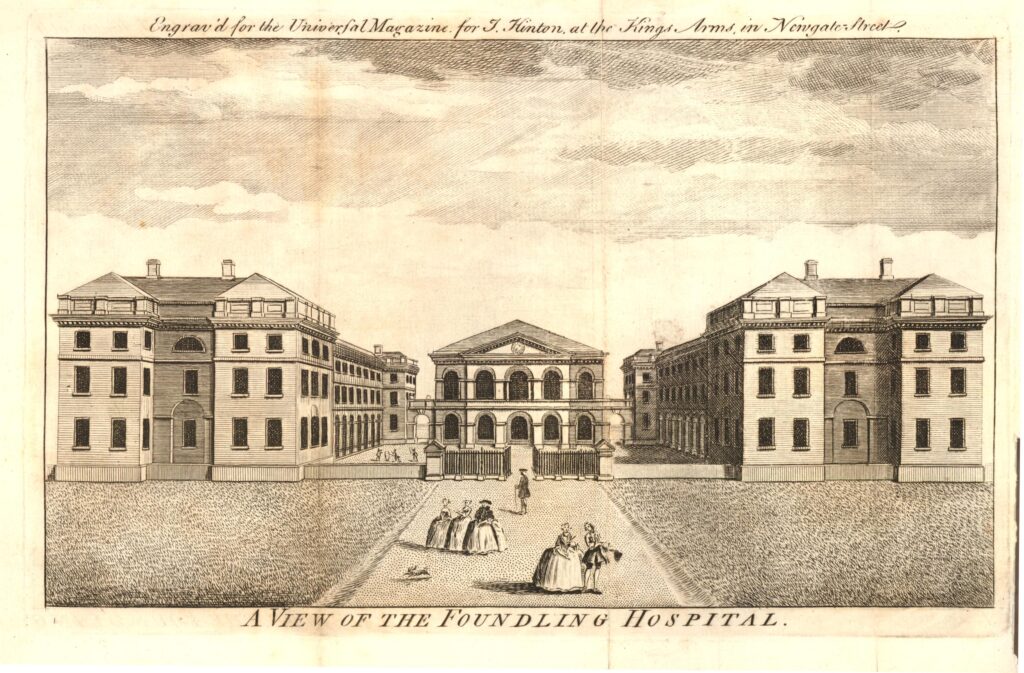
FOUSIL – The name of a public house, where the Eccentrics assemble in May’s Buildings, St. Martin’s Lane.
FREE AND EASY JOHNS – A society which meet at the Hole in the Wall, Fleet Street, to tipple porter, and sing bawdry.
GALIMAUFREY – A hodgepodge made up of the remnants and scraps of the larder.
GILE’S or ST. GILE’S BREED – Fat, ragged, and saucy; Newton and Dyot Streets, the grand headquarters of most of the thieves and pickpockets about London, are in St. Giles’s.
Part of the Rookery, St Giles by John Wykeham Archer ( © The Trustees of the British Museum):
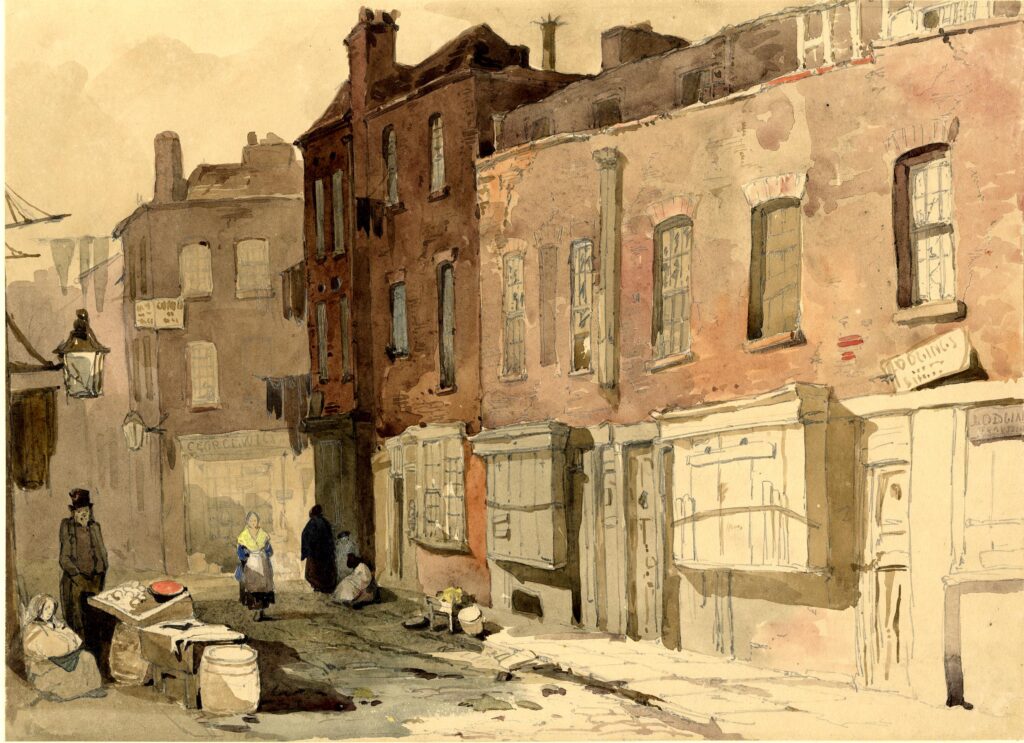
GO SHOP – The Queen’s Head in Duke’s Court, Bow Street, Covent Garden; frequented by the under players; where gin and water was sold in three-halfpenny bowls, called Goes; the gin was called Arrack.
GOLD FINDER – One whose employment is to empty necessary houses; called also a tom-turd-man, and night-man; the latter, from that business being always performed in the night.
GOOD MAN – A word of various imports, according to the place where it is spoken: in the city it means a rich man; at Hockley in the Hole, or St. Giles’s, an expert boxer, at a bagmo in Covent Garden, a vigorous fornicator; at an alehouse of tavern, one who loves his pot or bottle; and sometimes, though but rarely, a virtuous man.
GREENWICH BARBERS – Retailers of sand from the pits at and about Greenwich in Kent; perhaps they are styled barbers, from their constant shaving the sand banks.
GREENWICH GOOSE – A pensioner of Greenwich Hospital.
GRUB STREET – A street near Moorfields, formerly the supposed habitation of many persons who wrote for the book sellers; hence a Grub-street writer means a hackney author, who manufactures books for the booksellers.
HEDGE – To make a hedge; to secure a bet, or wager, laid on one side, by taking the odds on the other, so that, let what will happen, a certain gain is secured, or hedged in, by the person who takes this precaution, who is then said to be on velvet.
HELL – A taylor’s repository for his stolen goods, called cabbage. little Hell; a small dark covered passage, leading from London Wall to Bell Alley.
HIGHGATE – Sworn at Highgate; a ridiculous custom formerly prevailed at the public houses in Highgate, to administer a ludicrous oath to all travelers of the middling rank who stopped there. The party was sworn in a pair of horns, fastened on a stick, the substance of the oath was never to kiss the maid when he could kiss the mistress, never to drink small beer when he could get strong, with many other injunctions of the like kind; to all which was added the saving grace of ‘unless you like it best’. the person administering the oath was always to be called father by the juror; and he, in return, was to style him son, under the penalty of a bottle.
Swearing on the horns at Highgate ( © The Trustees of the British Museum):
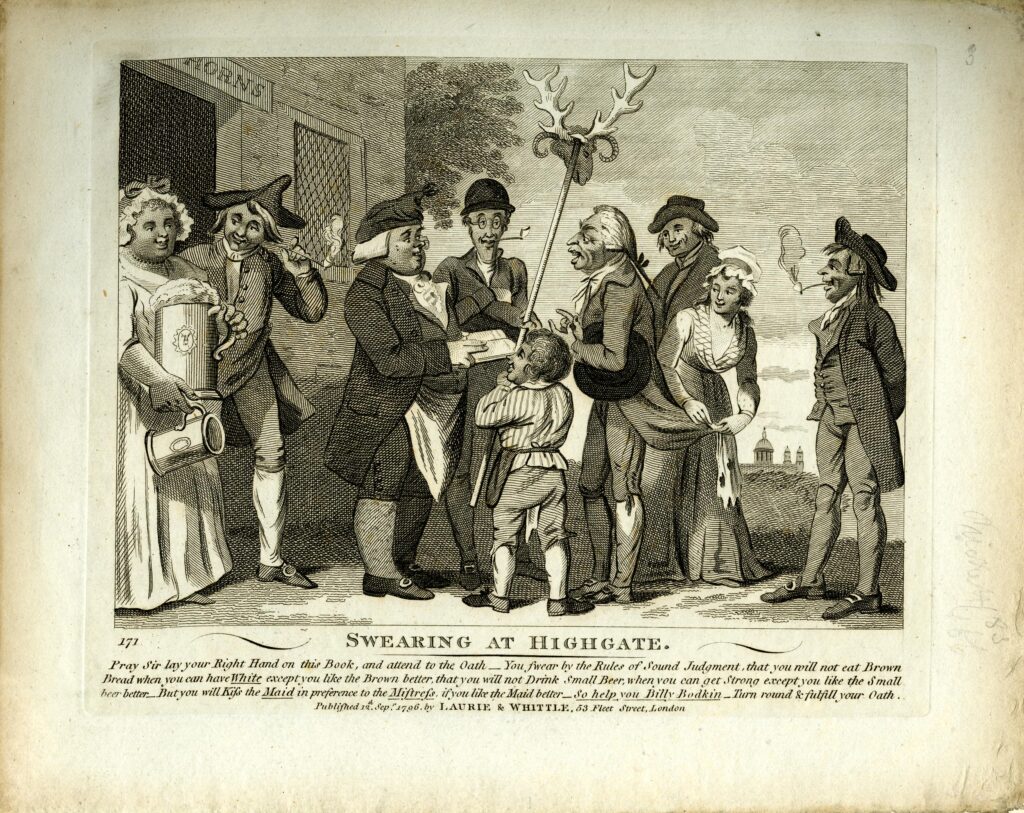
HOLBORN HILL – To ride backwards up Holborn Hill; to go to the gallows; the way to Tyburn, the place of execution for criminals condemned in London, was up that hill. Criminals going to suffer always ride backwards, as some conceive to increase the ignominy, but more probably to prevent them from being shocked with a distant view of the gallows; as in amputations, surgeons conceal the instruments with which they are going to operate. The last execution at Tyburn, and consequently of this procession, was in the year 1784, since when criminals have been executed near Newgate.
Being taken along Holborn Hill to Tyburn ( © The Trustees of the British Museum):
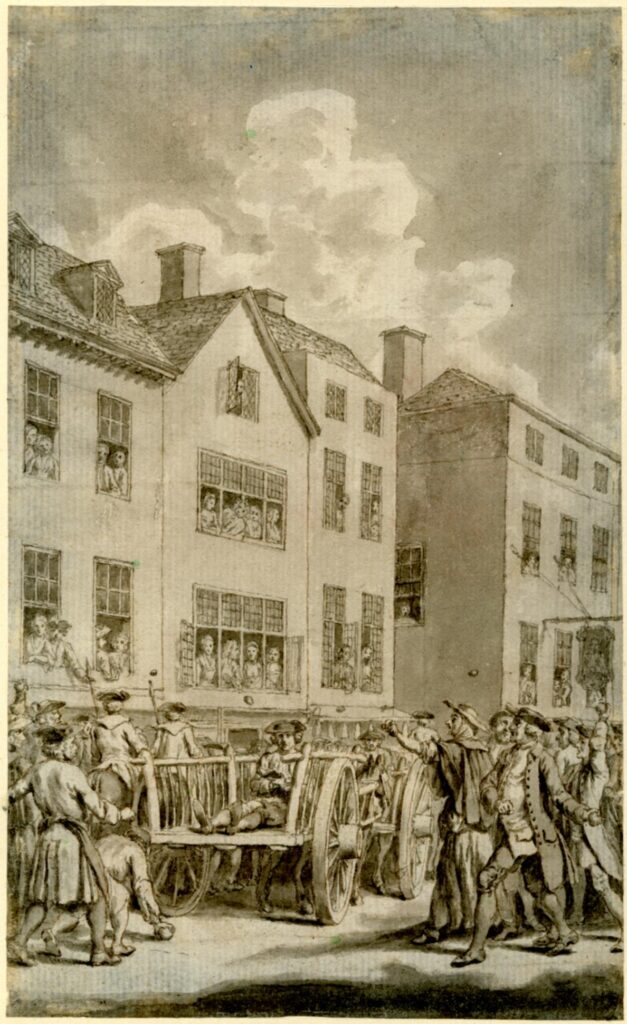
HOOF – To beat the hoof; to travel on foot. he hoofed it or beat the hoof every step of the way from Chester to London.
HUSH MONEY – Money given to hush up or conceal a robbery, theft, or any other offence, or to take off the evidence from appearing against a criminal.
IMPOST TAKERS – Usurers who attend the gaming-tables, and lend money at great premiums.
IRON – Money in general. To polish the king’s irons with one’s eyebrows – to look out of grated or prison windows.
ISLAND – He drank out of the bottle till he saw the island; the island is the rising bottom of the wine bottle, which appears like an island in the centre, before the bottle is quite empty.
JACK ADAMS – A fool. Jack Adam’s parish; Clerkenwell
JARVIS – A Hackney coachman
JOSKIN – A countryman. The dropcove maced the Joskin of twenty quid means The ring dropper cheated the countryman of twenty guineas.
TO KEEP IT UP – To prolong a debauch. We kept it up finely last night; metaphor drawn from the game of shuttlecock.
KEEPING CULLY – One who keeps a mistress, as he supposes, for his own use, but really for that of the public.
KICKS – Breeches. A high kick; the top of the fashion. It is all in the kick; it is the present mode. Tip us your kicks, we’ll have them as well as your lour; pull of your breeches, for we must have them as well as your money.
KIDNAPPER – Originally one who stole or decoyed children or apprentices from their parents or masters, to send them to the colonies; also called spiriting, but now used for all recruiting crimps for the king’s troops, or those of the East India company; and agents for indenting servants for the plantations, &c.
KNIGHT OF THE ROAD – A highwayman.
KNIGHT OF THE WHIP – A coachman.
KNOCK ME DOWN – Strong ale or beer.
KNOT – A crew, gang, or fraternity. He has tied a knot with his tongue, that he cannot untie with his teeth; i.e. he is married.
LACED MUTTON – A prostitute.
LADYBIRDS – Light or lewd women.
LAG FEVER – A term of ridicule applied to men who being under sentence of transportation, pretend illness, to avoid being sent from gaol to the hulks.
LAVENDER – Laid up in lavender; pawned.
LAWFUL BLANKET – A wife.
LAYSTALL – A dunghill about London, one which the soil brought from the necessary houses is emptied, or, in more technical terms, where the old gold collected at weddings by the Tom turd man is stored.
LIKENESS – A phrase used by thieves when the officers or turnkeys are examining their countenance. As the traps are taking our likeness; the officers are attentively observing us.
LITTLE BARBARY – Wapping
LITTLE EASE – A small dark cell in Guildhall, London, where disorderly apprentices are confined by the city chamberlain: it is called Little Ease from its being so low that a lad cannot stand upright in it.
LUMPERS – Persons who contract to unload ships; also thieves who lurk about wharfs to pilfer goods from shops, lighters &c.
LUSH – Strong beer.
MACCARONI – An Italian pasta made of flour and eggs. Also a fop; which name arose from a club called the Maccaroni Club, instituted by some of the most dressy travelled gentlemen about town, who led the fashions; whence a man foppishly dressed, was supposed a member of that club, and by contraction styled a Maccaroni.
MAN OF THE TOWN – A rake, a debauchee.
MEN OF KENT – Men born east of the river Medway, who are said to have met the Conqueror in a body, each carrying a green bough in his hand, the whole appearing like a moving wood; and thereby obtaining a confirmation of their ancient privileges. the inhabitants of Kent are divided into Kentish men and men of Kent. Also a society held at the Fountain Tavern, Bartholomew Lane, A.D. 1743.
MINOR CLERGY – Young chimney sweepers.
MISCHIEF – A man loaded with mischief, i.e. a man with his wife on his back.
MITE – A nick name for a cheesemonger; from the small insect of that name found in cheese.
MOBILITY – The mob; a sort of opposite to nobility.
MONEY DROPPERS – Cheats who drop money, which they pretend to find just before some country lad; and by way of giving him a share of their good luck, entice him into a public house, where they and their confederates cheat or rob him of what money he has about him.
MOON CURSER – A link-boy; link-boys are said to curse the moon, because it renders their assistance unnecessary; these gentry, frequently, under colour of lighting passengers over kennels, or through dark passages, assist in robbing them.
MUD LARK – A fellow who goes about the water side picking up coals, nails, or other articles in the mud.
MUNSTER PLUMS – Potatoes
I hope that gives you an idea of the contents of Captain Grose’s Dictionary of the Vulgar Tongue, and the colourful language that was once heard across the streets of London.
I will explore letters N to Z in a future post.
